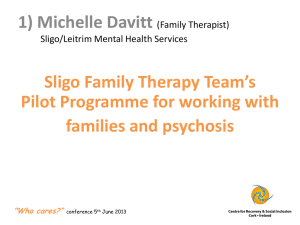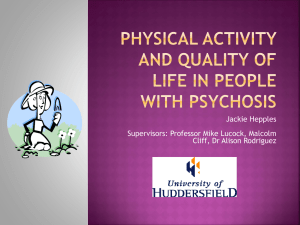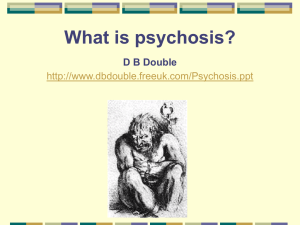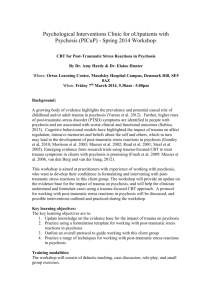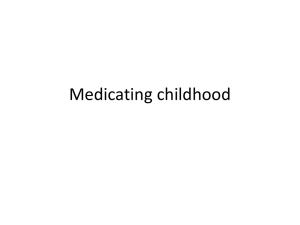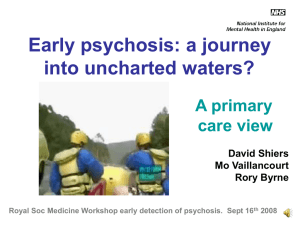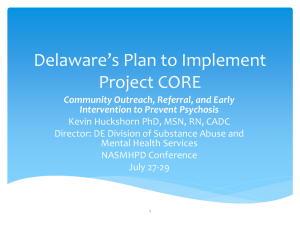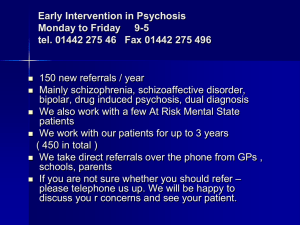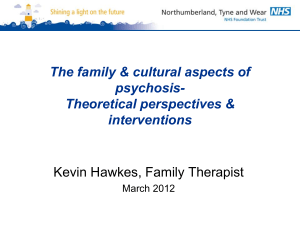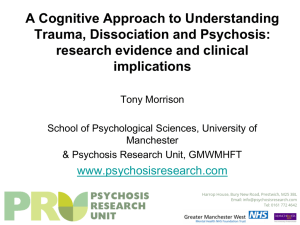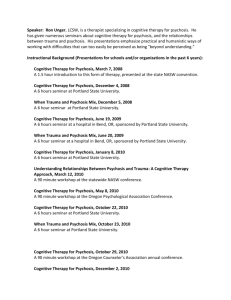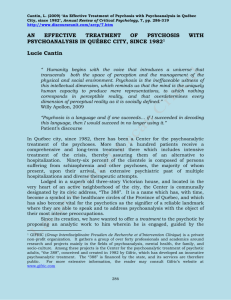Four seminars by Ron Unger - Recovery from “Schizophrenia” and
advertisement
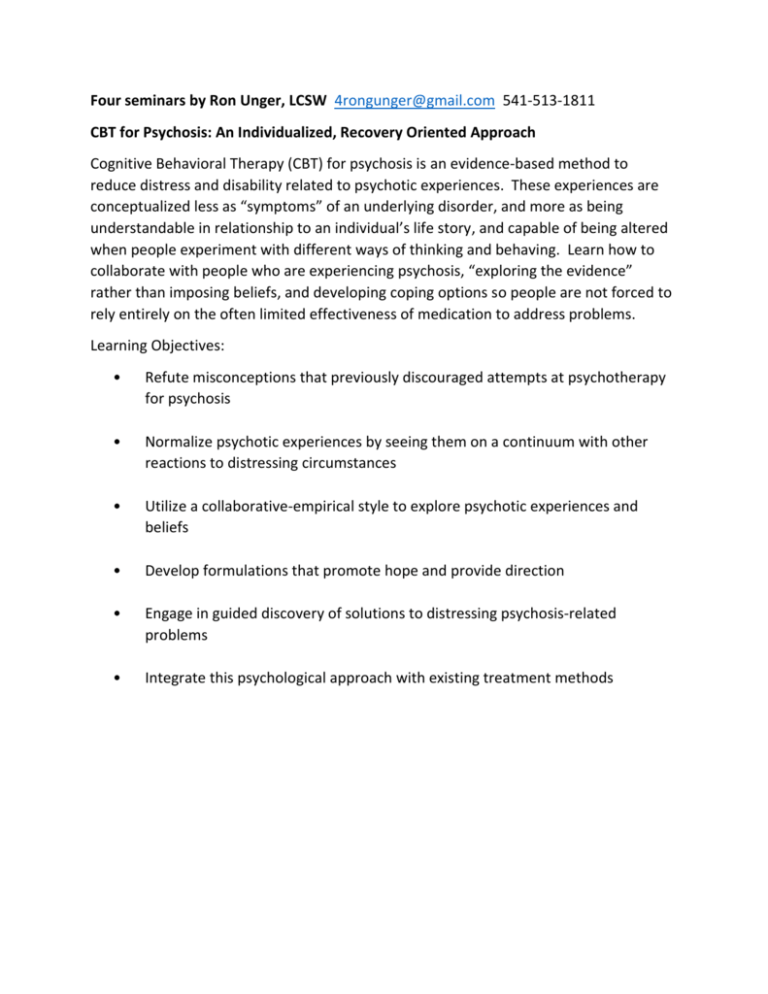
Four seminars by Ron Unger, LCSW 4rongunger@gmail.com 541-513-1811 CBT for Psychosis: An Individualized, Recovery Oriented Approach Cognitive Behavioral Therapy (CBT) for psychosis is an evidence-based method to reduce distress and disability related to psychotic experiences. These experiences are conceptualized less as “symptoms” of an underlying disorder, and more as being understandable in relationship to an individual’s life story, and capable of being altered when people experiment with different ways of thinking and behaving. Learn how to collaborate with people who are experiencing psychosis, “exploring the evidence” rather than imposing beliefs, and developing coping options so people are not forced to rely entirely on the often limited effectiveness of medication to address problems. Learning Objectives: • Refute misconceptions that previously discouraged attempts at psychotherapy for psychosis • Normalize psychotic experiences by seeing them on a continuum with other reactions to distressing circumstances • Utilize a collaborative-empirical style to explore psychotic experiences and beliefs • Develop formulations that promote hope and provide direction • Engage in guided discovery of solutions to distressing psychosis-related problems • Integrate this psychological approach with existing treatment methods Trauma, Dissociation, and Psychosis: CBT and Other Approaches to Understanding and Recovery A large number of studies now provide strong evidence that psychosis can often be an understandable reaction to trauma, abuse, and other difficult life experiences, with dissociation at the center of that reaction. Explore a science based yet humanistic conceptualization of extreme human experiences, and discover ways to use CBT and other methods to help people change their relationship with these experiences, including collaborating with them in building coherent and compassionate self narratives that set the stage for real recovery. Prior knowledge of CBT for psychosis is helpful but not required for this seminar. Learning Objectives: Identify possible interrelationships between trauma, dissociation, and psychosis, including ways that psychosis itself, and reactions to psychosis by others, can be traumatizing Discern a variety of possible causal routes from trauma to psychotic experiences, and understand the possible role of dissociation within that process Utilize proven cognitive strategies to address command and persecutory voices, and other common yet distressing experiences found in trauma-associated psychosis Integrate cognitive therapy for psychosis with other trauma therapies to effectively treat clients who have experienced both trauma and psychosis Assist clients in developing coherent and compassionate stories of trauma and recovery which provide a positive alternative to both fragmented “psychotic” stories, and to helplessness-inducing “mental illness” stories. Exploring Ethical Dilemmas related to Diagnosis, Drugs, and other Possibly Iatrogenic Aspects of Mental Health Care Clinicians are trained to “first, do no harm” yet all methods of helping carry at least some risk. Dilemmas become more complex when we discover that heavily promoted methods effective in the short term are likely worsening problems in the long run, and that evidence of serious risks has been suppressed by entities focused on profit. In the midst of such difficulties, how can we offer helpful treatment, and provide opportunities for balanced informed consent, while protecting our clients from unnecessarily risky interventions by ourselves and others? And how can we maintain constructive relationships with people from other professions who may be minimizing risks, while also staying within the boundaries of our own license? Are existing ethical codes sufficient to answer these questions, or must deeper issues be examined in order to minimize harm? This seminar will include lecture and experiential activities to help clinicians sort through their fears and uncertainties related to these dilemmas, so they can develop their own ethically informed approaches. Identify the dimension of ethics that transcends simple adherence to fixed ethical codes and legal risk reduction strategies, so that the ethical component of each clinical decision can be recognized. Explore possible strategies for situations where it is not possible to insure that no harm will be done, and where instead choices must be made between risk of harm resulting from failure to treat and risk from treatment options. Become familiar with the use of dialogue and “balanced thinking” to address binds and double binds faced by both individuals requiring treatment and by mental health professionals. Recognize five key areas of risk in mental health care, and ethical problem areas in prevailing approaches to those risks. Develop your own strategy for a balanced approach to ethical dilemmas concerning iatrogenic risk, as well as a strategy for rebalancing that approach as more information becomes available. Foster real informed consent and collaboration by learning ways to communicating effectively about risks, uncertainties, and ethical dilemmas, with individuals, family members, and other professionals. Addressing Spiritual Issues Within Bipolar and Psychosis People diagnosed with bipolar and psychotic disorders frequently speak of their experience using spiritual concepts and metaphors, though often in idiosyncratic or confusing ways. While mainstream approaches typically frame this spiritual interest as “hyper-religiosity,” research shows that spiritually helpful experiences can occur in the midst of bipolar and psychotic crisis, and spiritual understanding and practice is often cited as a key factor in recovery. Integrating an understanding of this research into treatment requires that helpers develop a more open minded understanding of the core issues in bipolar, psychosis and of human existence in general which are often framed as spiritual, and become willing to accept uncertainty as they collaborate with people in sorting through both “spiritual errors” and the possibly positive aspects of extreme or otherworldly experiences and perspectives. This seminar aims to familiarize helpers with the principles of this kind of approach, and it is designed to make sense to people with a wide variety of spiritual and/or non-spiritual perspectives. Learning Objectives: Explore how to integrate spiritual language and metaphors with scientific and psychological language and approaches Understand how the core issues in trauma, extreme moods and psychosis are commonly framed in spiritual terms, and how these relate to basic human dilemmas Conceptualize extreme moods and psychosis as involving attempts to resolve such dilemmas using ways of thinking and feeling that step outside the terms of “mundane” reality, and explore approaches to helping people complete these attempts successfully Develop cultural competence in addressing spiritual issues within a recovery oriented approach to bipolar and psychosis while working with individuals from a variety of traditions and subcultures
